The Rituals of the Roman Legion: Spirituality in Military Life reveal a dimension of the Roman army often overshadowed by tales of conquest and strategy. Roman Legion spirituality was not merely a backdrop but a driving force that shaped the daily existence of soldiers. Religious rituals played a critical role in establishing discipline, reinforcing loyalty, and boosting morale within the ranks.
These rituals went beyond personal belief, weaving a collective identity that bound legionaries to Rome and to each other. The spiritual framework provided meaning to their sacrifices, battles, and hardships.
In this article, you will explore:
- How religion was embedded in every aspect of military life.
- The major deities revered by soldiers and their roles.
- Specific ceremonies that marked key moments from war declarations to daily routines.
- Ways in which spirituality reinforced unity and loyalty in one of history’s most formidable military forces.
Understanding Roman military rituals offers fresh insight into the power of faith as a tool for cohesion and strength.
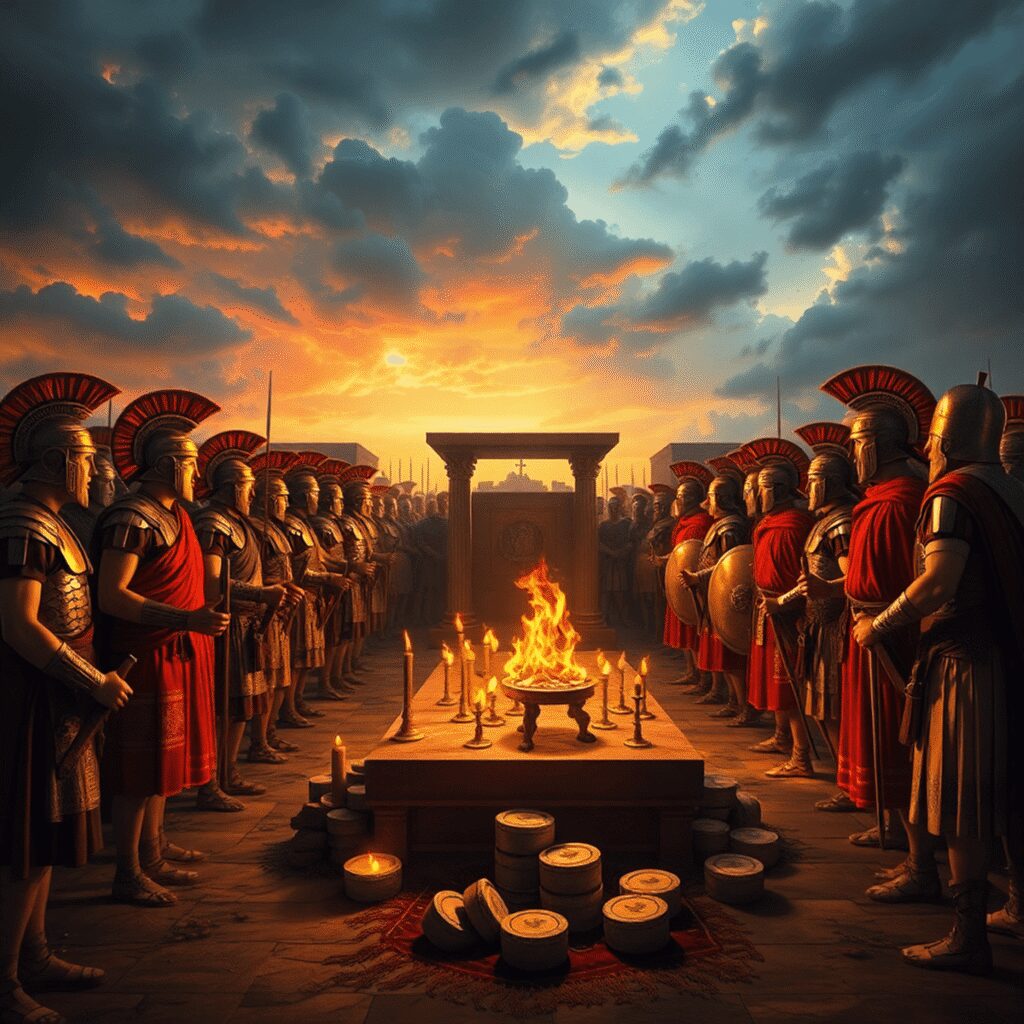
The Role of Religion in the Roman Legion
Religion was not just an afterthought but an essential part of everyday life in the Roman army. It influenced how soldiers viewed their responsibilities and their role in Rome’s vast empire. The religion of the Roman army dictated rituals, ceremonies, and even decision-making processes that governed everything from battle preparations to camp discipline.
Daily Religious Practices of Legionaries
Legionaries practiced their faith constantly, engaging in prayers, sacrifices, and rites aimed at securing divine favor. This religious observance functioned as a binding agent for soldiers who came from diverse backgrounds and regions of the empire. Shared participation in spiritual practices fostered a strong sense of unity and military cohesion. The collective belief in gods watching over the legions created an environment where loyalty extended beyond individual commanders to the entire Roman state.
Faith, Duty, and Loyalty
The connection between legionary faith and loyalty was profound. Soldiers were expected to demonstrate pietas—a sense of duty not only towards their commanders but also toward the gods and Rome itself. This reinforced discipline and commitment, making soldiers more resilient during hardships on campaign. Spiritual rituals served as reminders that their service was part of a sacred contract with divine powers who guaranteed success if honored properly.
Morale Boosters on the Battlefield
Religious devotion was integral to maintaining morale among troops. Confidence in divine protection often translated into courage on the battlefield. The belief that gods like Mars or Jupiter supported their cause gave legionaries a psychological edge, strengthening their resolve to fight for Rome’s glory. Without this spiritual foundation, the organizational strength and effectiveness of the Roman legions would have been significantly diminished.
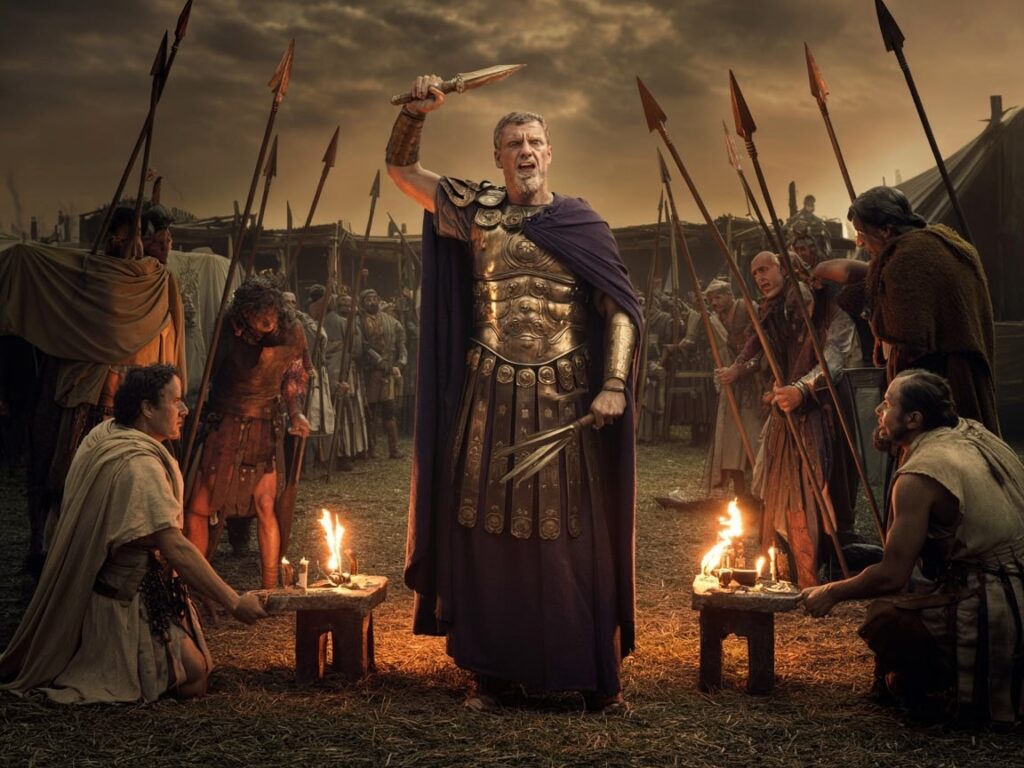
Key Deities of the Roman Military
The spiritual framework of the Roman Legion centered on several key gods, each embodying vital aspects of military life and success. Understanding these deities reveals how the Romans intertwined faith with warfare.
1. Mars, god of war
Mars was the primary divine figure for soldiers. Seen as a fierce warrior and protector, his presence was believed to inspire courage and ferocity in battle. Unlike other gods who symbolized broader concepts, Mars represented the raw power and violence necessary for conquest. His favor was sought before campaigns to ensure victory and protection.
2. Jupiter, patron warrior and king of gods
Jupiter held supreme authority over both the heavens and earthly affairs. As patron of warriors, he embodied law, order, and justice—qualities essential to maintaining discipline within the legion. Soldiers trusted Jupiter to uphold Rome’s divine mandate and to grant legitimacy to their military actions.
3. Minerva, protector of legionaries
Minerva’s role focused on wisdom, strategy, and skill in combat. She offered guidance beyond brute strength—favoring tactics, planning, and craftsmanship. Legionaries invoked her for protection during sieges or complex operations where intellect was as crucial as force.
4. Janus, guardian of gates
Janus symbolized beginnings, transitions, and thresholds. His two faces looked both forward and backward—representing vigilance over entry points such as city gates or camp boundaries. In military contexts, Janus presided over the opening of warfare or peace negotiations, marking crucial turning points.
5. Cybele, foreign deity adopted in times of crisis
The Romans integrated Cybele from Phrygia during emergencies requiring divine intervention beyond traditional pantheon limits. Known as Magna Mater (Great Mother), she represented fertility and protection but also fierce power capable of unsettling enemies through spiritual influence.
Each deity contributed distinct attributes that shaped legionary identity and morale. Soldiers did not merely fight; they participated in a sacred relationship where these gods provided strength, wisdom, justice, vigilance, or supernatural aid critical for enduring hardships and achieving glory on the battlefield.
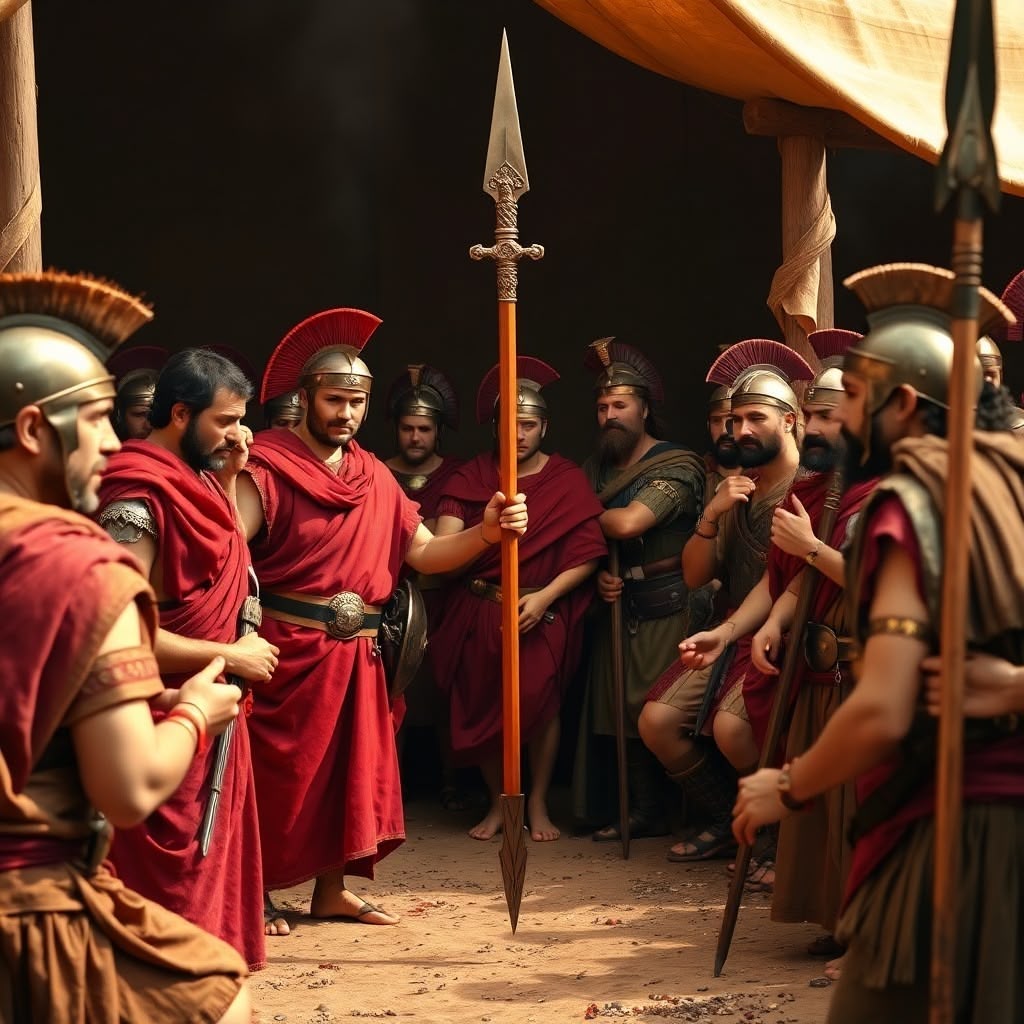
Rituals and Ceremonies in Military Life
Roman military rituals were an essential part of everyday life for soldiers in the legions. They served to reinforce discipline and seek the favor of the gods. Here are some key aspects of these rituals:
Sacrifices and Offerings
Sacrifices were a common practice among Roman soldiers, although they didn’t always involve animals at first. Instead, offerings such as wine, incense, and cakes were presented to the gods. These symbolic sacrifices expressed devotion while maintaining ritual purity ahead of battle.
Military Holidays and Festivals
Military holidays in Rome were significant occasions for the legions. They celebrated key deities associated with warfare and protection. For example, festivals dedicated to Jupiter Optimus Maximus, the supreme god and guardian of the state, held great importance for soldiers. Such holidays provided opportunities for troops to honor their patrons collectively, strengthening group identity through shared worship.
The Mars vigila Ritual
One of the most striking ceremonies was the Mars vigila ritual, conducted by the pontifex maximus—the chief priest of Rome. This ritual involved drawing Mars’ sacred spear from its sheath with a solemn cry of “Mars vigila!” (“Mars, watch!”). This act symbolized the official commencement of war activities and called upon Mars’ vigilance to protect and guide Roman forces.
War Dances within the Legions
War dances also played an essential role in spiritual military life. Brotherhoods within the legions performed these dances twice a year, combining physical exertion with religious expression. The movements were believed to channel martial energy and unify soldiers through rhythm and shared tradition.
These rituals were more than mere formalities—they created a sacred atmosphere that intertwined faith with duty. They helped soldiers confront the uncertainties of war with confidence rooted in divine support.
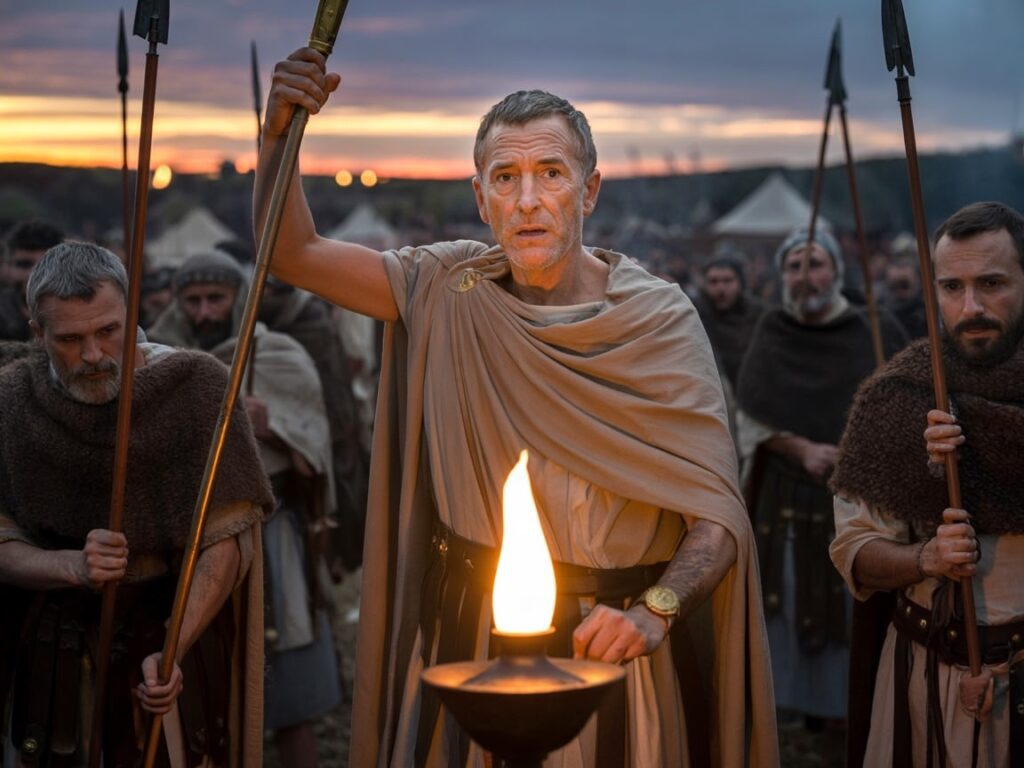
The Declaration of War as a Sacred Ceremony
The declaration of war ritual in the Roman Legion was a highly formalized and sacred process. This ceremony was conducted by the college of fetiales priests, whose role was to ensure that warfare remained just and sanctioned by the gods. The fetiales wore distinctive woollen attire and headbands, symbolizing their religious authority and the solemnity of their task.
1. Diplomatic Efforts Before War
Before any military action, the fetiales approached enemy territory or a public forum to present formal demands for redress or compensation. This diplomatic step aimed to resolve conflicts peacefully and avoid unnecessary bloodshed. The demands acted as a warning: if ignored for 33 days, Rome considered war legitimate.
2. The Blood-Tanned Spear Ceremony
A defining moment of this ritual was the blood-tanned spear ceremony. The fetiales would take a spear dipped in sacrificial blood and throw it into enemy land. This act was not merely symbolic — it invoked the gods as witnesses, binding both sides to the concept of bellum iustum or “just war.” Through this sacred gesture, Romans justified their military campaigns as morally and divinely sanctioned, not as acts of aggression or robbery.
3. War as a Contract
This ritual emphasized that war was a contract between Rome, its soldiers, and the gods. It reinforced discipline by reminding legionaries that their fight was under divine scrutiny. The involvement of religious rites helped maintain order within ranks and ensured that soldiers viewed their mission as righteous and necessary.
Spiritual Practices Reinforcing Legionary Loyalty and Unity
The concept of pietas was central to the Roman legionary’s identity. This sense of duty extended beyond personal faith, encompassing loyalty to the gods, the country, and one’s family. Soldiers shared this commitment, which created a powerful bond that held units together under immense pressure. The devotion to pietas acted as a moral compass, guiding actions both on and off the battlefield.
The Role of Military Standards
Military standards, or signa, were more than mere flags or symbols. These standards embodied the spirit and honor of each legion. Soldiers showed profound reverence for military standards, treating them as sacred objects representing their collective identity. Losing a standard was considered a catastrophic dishonor, while protecting it was a paramount duty that reinforced unit cohesion.
The Influence of Haruspices
Haruspices, specialized priests skilled in omen interpretation, played a crucial role during campaigns. They read signs from animal entrails, bird flights, and other natural phenomena to divine the will of the gods. Their interpretations influenced strategic decisions and troop morale by providing divine guidance. Commanders relied on these readings to secure favor from the gods before battles or important maneuvers.
These spiritual practices intertwined with military discipline, reinforcing an unbreakable sense of loyalty and unity essential for the Roman Legion’s effectiveness in war.
- Shared pietas cultivated loyalty not only to deities but also to comrades and Rome itself.
- Military standards served as physical focal points for unity and pride.
- Haruspices offered spiritual insights that affected tactical choices and inspired confidence among soldiers.
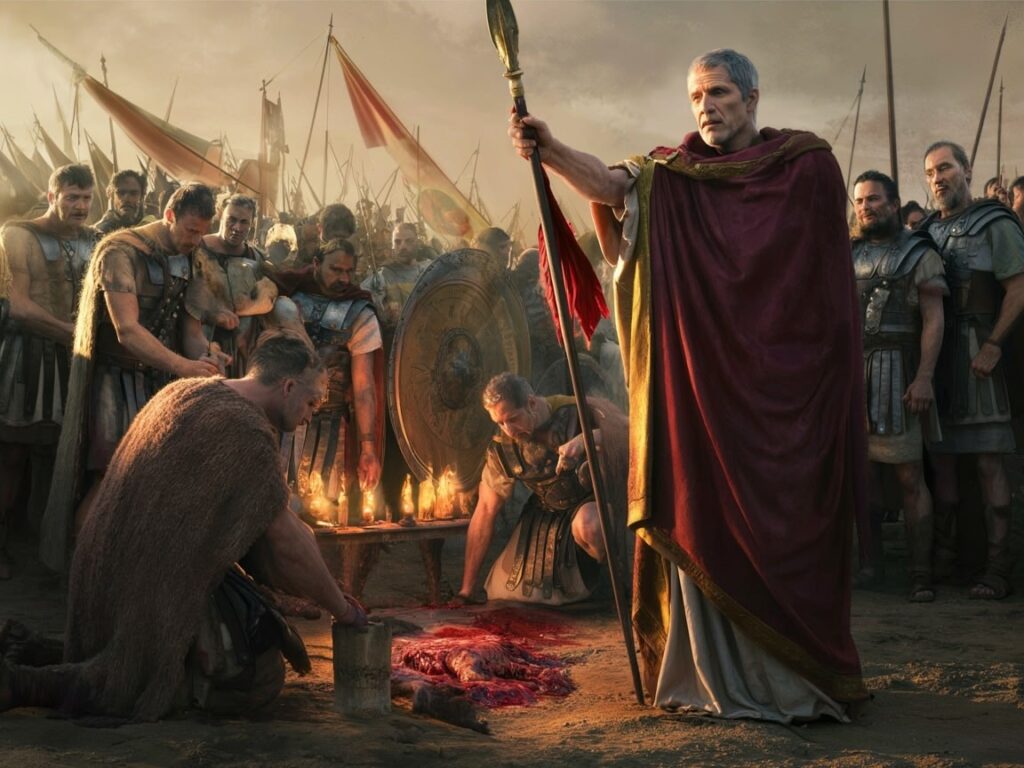
Integration of Spirituality in Daily Military Routine
Religious rites were not reserved for special occasions alone; they formed an essential part of the Roman legionaries’ daily drills and routines. The repetitive nature of these rites helped embed spirituality into the soldiers’ mindset, reinforcing discipline and collective identity. Before and after training exercises, soldiers often performed brief prayers or made offerings to their patron deities to seek divine favor and protection during upcoming battles.
Common Cult Practices Among Legionaries
Common cult practices served as a powerful social glue binding legionaries beyond their combat roles:
- Morning prayers to Jupiter Optimus Maximus invoked strength and justice for the day ahead.
- Offerings of incense and small cakes took place at designated altars within the camp, symbolizing respect toward gods like Mars and Minerva.
- Participation in shared festivals celebrated sacred days on the military calendar, reinforcing camaraderie through ritualized celebrations.
- Private devotions allowed soldiers to maintain personal connections with protective deities or household spirits, much like modern offerings made to deities such as Persephone where items like seasonal fruits or flowers could be given as a gesture of respect and devotion (more about offerings).
This routine integration extended to the maintenance of sacred military standards. Legionaries treated these standards not just as symbols of rank but as living icons imbued with spiritual significance. Care for these items was performed ritually, reflecting the belief that neglect could invite misfortune.
The constant presence of religious elements within everyday life created a rhythm where faith and duty were inseparable. Such practices ensured that spirituality was not an abstract concept but a lived experience shaping every moment — a foundational pillar in the Rituals of the Roman Legion: Spirituality in Military Life.
Conclusion
The Rituals of the Roman Legion: Spirituality in Military Life show us how closely connected faith and warfare were. Religion wasn’t just something in the background; it played a crucial role in:
- Strengthening discipline and morale.
- Reinforcing loyalty to Rome and its legions.
- Creating a shared identity among soldiers through sacred ceremonies and daily rites.
By understanding the importance of religious rituals in the army, we gain valuable insights into how the Roman Legion stayed united and effective for centuries. This spiritual aspect, often overlooked, was key to their military success.
We encourage you to explore this captivating part of ancient military history further. The Roman Legion spirituality summary prompts us to consider how belief systems can bring together and empower groups facing great difficulties. Studying these rituals deepens our understanding of one of history’s most powerful armies, revealing that their strength came from both divine and martial sources.

